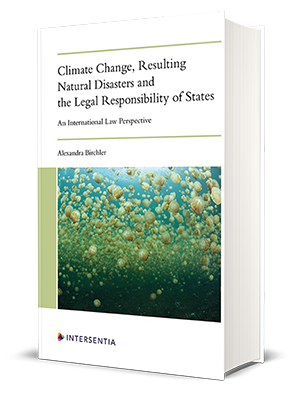| Interview |


Author speaking: Alexandra Birchler
ALEXANDRA BIRCHLER is corporate legal counsel at an insurance firm in Zurich, Switzerland. She holds a joint doctorate in law from the University of Lucerne, Switzerland, and the University of Wollongong, Australia.
Climate change is a reality. Is there a legal framework for disaster situations?
There is not a specific legal framework that applies. It is rather a set of legal frameworks that apply to disaster situations. From an international law perspective there are, of course, human rights, which apply in all situations. But there is also general public international law and international environmental and climate change law or the law of transboundary harm.
What legal responsibility do countries now have?
This depends on the particular setting and the law that is applicable. There are for example various obligations for States under human rights before and during a disaster. In addition, also international environmental and climate change law are posing legal responsibilities upon States in the context of climate change related extreme weather events.
The effects of climate change do not affect all countries equally, nor all countries contribute in the same way to causing it. From a legal point of view, how should be funding for reconstruction?
From a legal point of view, this is a question on liability. However, the one of the main issues with liability in climate change cases, is the causal link between the emission and the actual damage. If the law recognizes a responsibility the next question is, how this can be remedied. One option could be to contribute into climate funds that help affected States to fund their post disaster reconstruction.
These episodes are becoming more frequent and more intense, what is the relationship to human rights?
In principle human rights law applies at all times, thus also before and during a natural disaster. Before a disaster strikes it is in particular the right to life, which asks the State to warn its citizens of the immediate danger. During a disaster situation several human rights are at risk. Examples are the right to life or the right to adequate standard of living and so on. This reflects the extreme vulnerability of the affected population during a disaster.
COP 26 takes place this month in Glasgow, what measures would you like to see agreed?
I would like to see some more substantial commitment for reaching the 1.5° Celsius target as well as a commitment on the financial goal of 100 bn USD / year for adaptation measures, which may also include disaster prevention measures (such as for example build back better initiatives). Both aspects are important to change things and reduce the risk of devastating extreme weather events.
About the book


Climate Change, Resulting Natural Disasters and the Legal Responsibility of States
Extreme weather events, resulting from anthropogenic climate change, disproportionately affect developing States such as the Caribbean and Pacific Islands, yet these states make a relatively small contribution to climate change compared to developed States and emerging markets. This book examines the legal responsibility of states with regard to post-disaster reconstruction and the duty to provide early warning from the perspective of various areas of international law, particularly as no specific, singular public international law instrument is applicable or responsible.
Alexandra Birchler
December 2020
ISBN 9781839700309